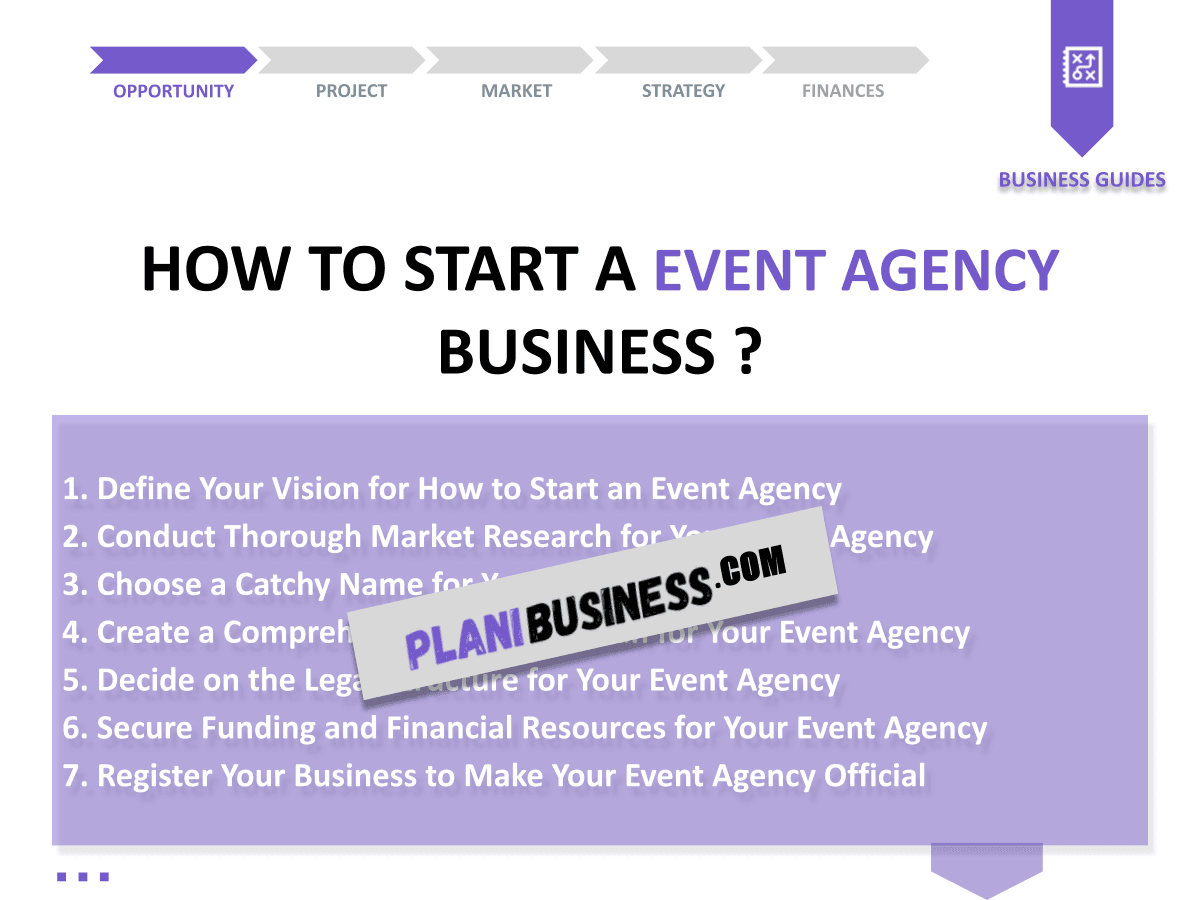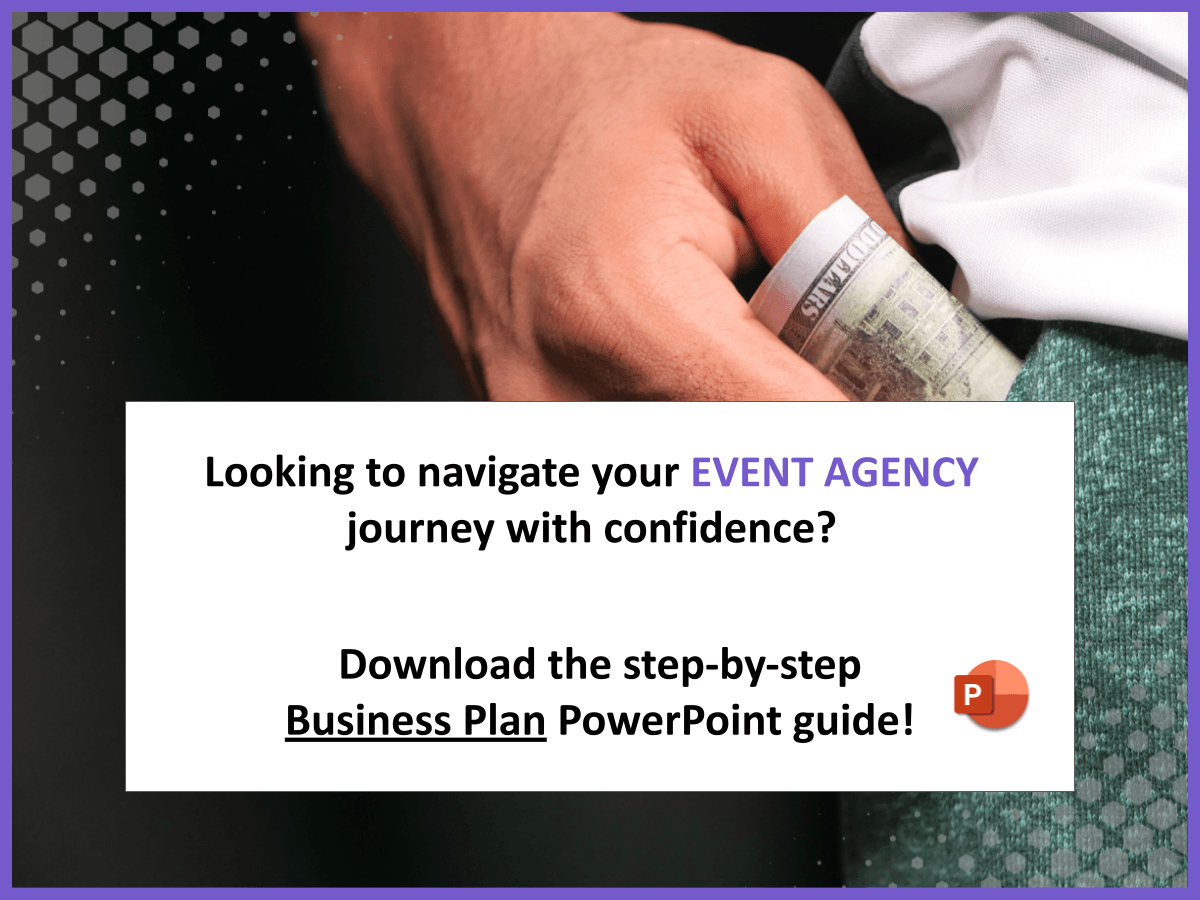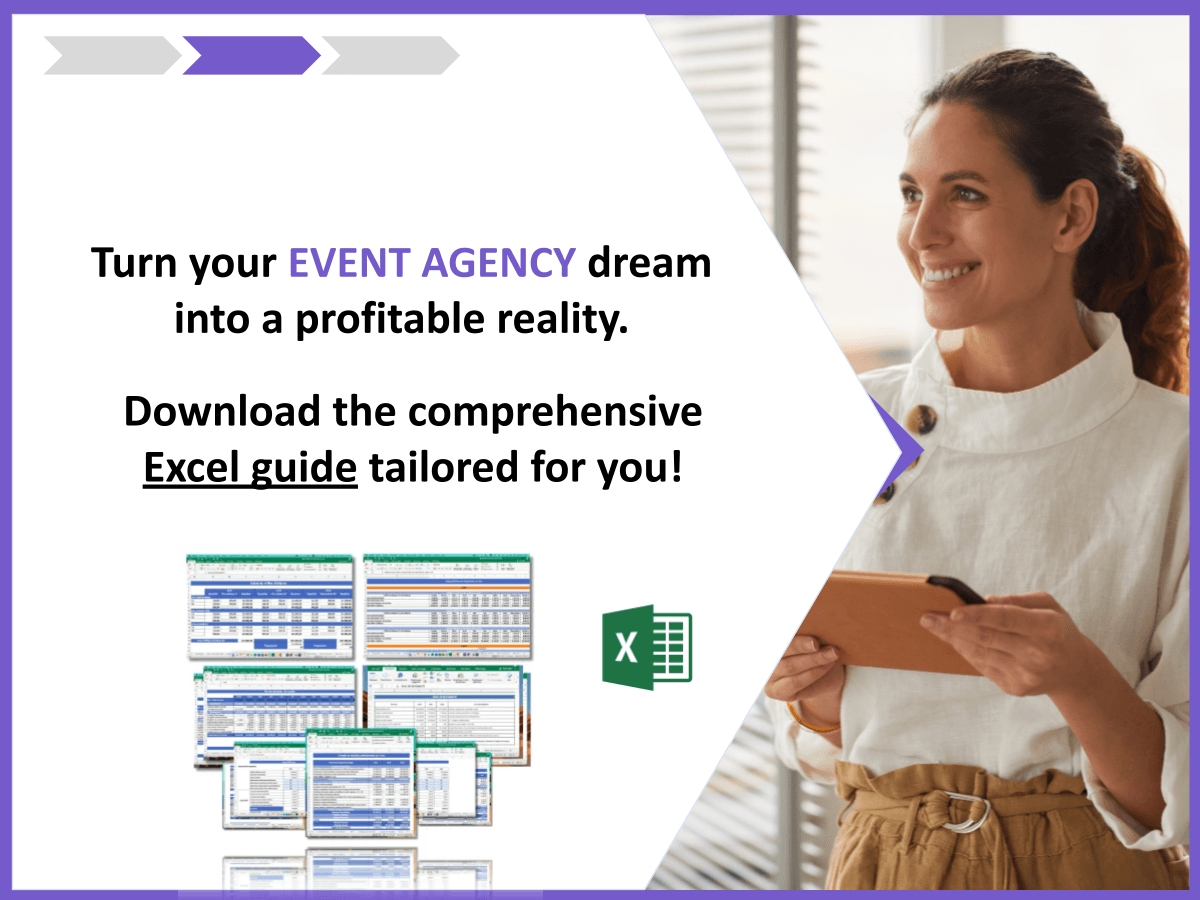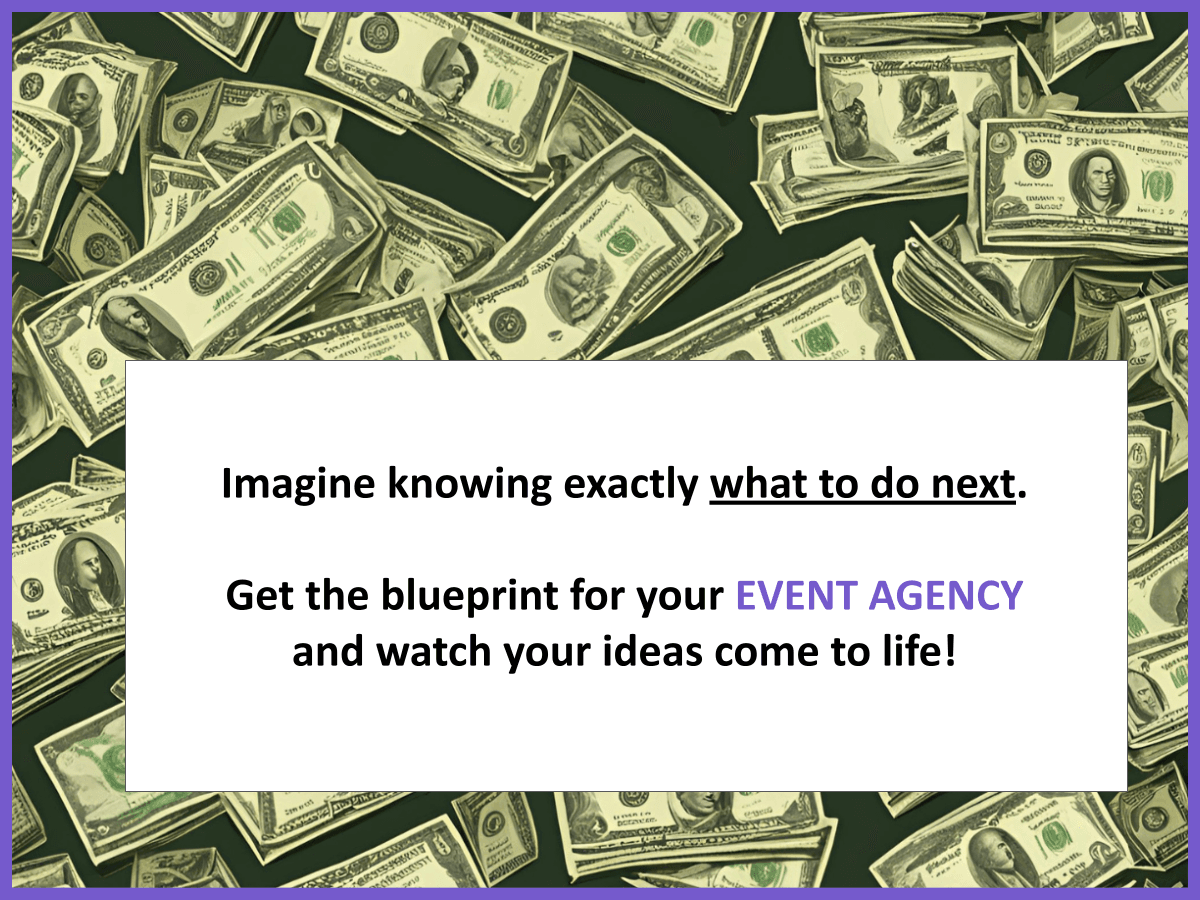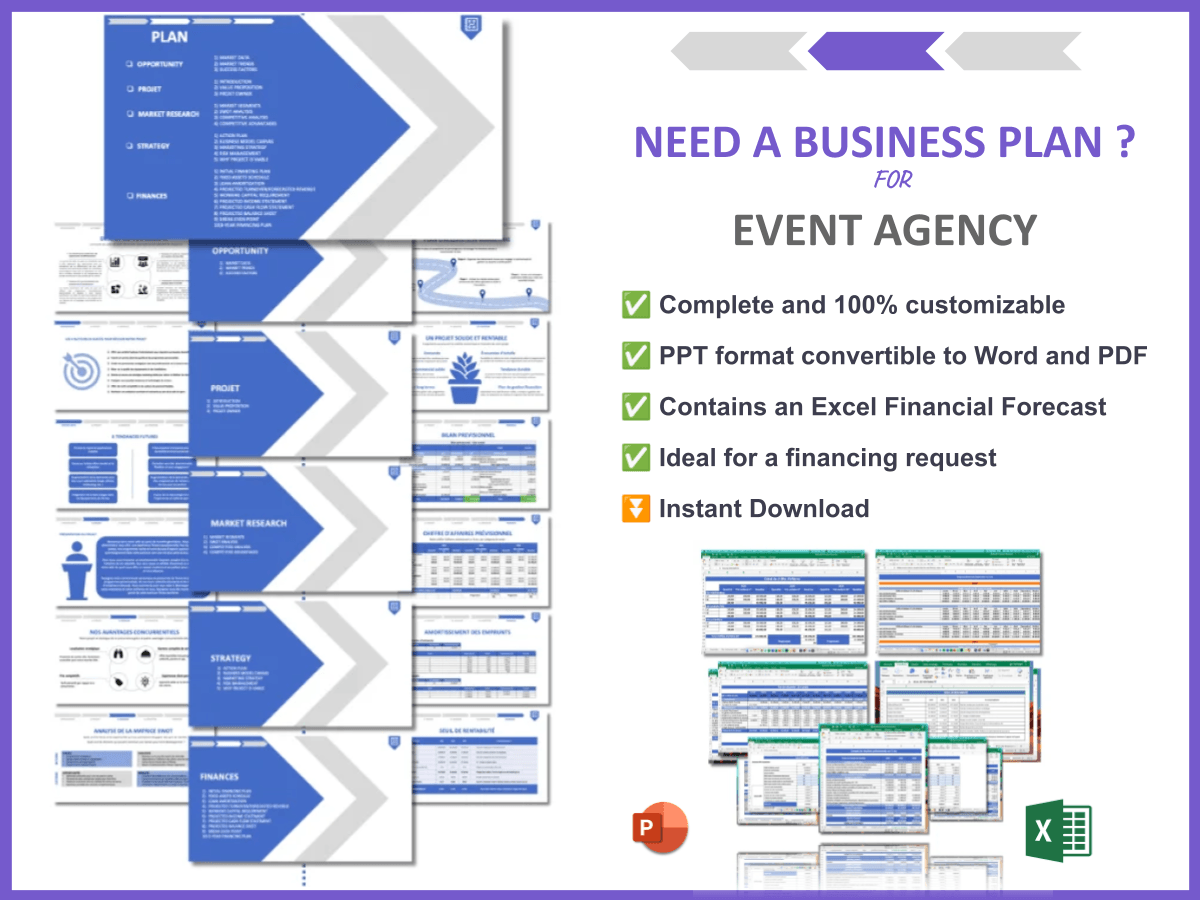Are you thinking about starting an event agency? You’re not alone! The event planning industry is booming, with an estimated growth rate of around 11% over the next few years. This exciting field offers endless opportunities for creative individuals looking to make their mark. How to Start an Event Agency is a question many aspiring entrepreneurs are asking as they embark on this journey. Essentially, starting an event agency involves organizing and managing various events, from weddings to corporate gatherings, while ensuring a seamless experience for clients and attendees alike.
In this article, we will explore the essential steps to help you launch your event agency successfully. You’ll learn how to:
- Define your vision and niche
- Conduct thorough market research
- Create a comprehensive business plan
- Establish your brand identity
- Market and promote your services effectively
- Assemble a talented team to support your agency
1. Define Your Vision for How to Start an Event Agency
Understanding your vision is crucial when starting your agency. Ask yourself what types of events you want to specialize in, whether it’s weddings, corporate events, or social gatherings. Reflect on your passions and experiences that can shape your agency’s identity. Consider these guiding questions:
- What are your interests in event planning?
- What unique skills do you bring to the table?
- Who is your target audience?
By answering these questions, you can create a clear vision statement for your agency. This will serve as a foundation for your brand and help guide your decision-making process as you move forward.
2. Conduct Thorough Market Research for Your Event Agency
Before diving into the world of event planning, conducting thorough market research is essential to identify potential clients and competitors. This research will help you understand the landscape of the industry and allow you to tailor your services to meet client needs. Here’s how to approach it:
- Identify Your Competitors: Research other event agencies in your area. What services do they offer? What are their strengths and weaknesses?
- Understand Your Target Market: Who are your ideal clients? Are they couples planning weddings, businesses organizing corporate events, or individuals hosting parties? Knowing your audience will help you craft tailored marketing messages.
- Analyze Market Trends: Stay updated on the latest trends in the event planning industry. For example, consider popular themes, venue preferences, and technology integration in events.
Use tables to organize your findings for better clarity. Here’s an example:
| Competitor | Specialty | Strengths |
|---|---|---|
| Agency A | Weddings | Strong client base, creative designs |
| Agency B | Corporate Events | Experienced staff, excellent vendor connections |
By identifying gaps in the market, you can position your agency to fill those needs, giving you a competitive edge as you start your journey in the event planning business.
3. Choose a Catchy Name for Your Event Agency
Your agency’s name is more than just a title; it’s the first impression clients will have of your business. A catchy and memorable name can set the tone for your brand and help you stand out in a crowded market. Here are some tips to consider when choosing a name:
- Reflect Your Niche: Make sure your name hints at the type of events you specialize in. For example, if you focus on weddings, consider names that evoke romance or celebration.
- Keep It Simple: Choose a name that is easy to spell and pronounce. Complicated names can be hard for clients to remember.
- Check Domain Availability: In today’s digital age, having an online presence is crucial. Ensure the domain name for your chosen name is available, as this will be important for your website.
Once you’ve brainstormed a list of potential names, test them out with friends or potential clients to gather feedback. This can provide valuable insights into how your name resonates with others.
4. Create a Comprehensive Business Plan for Your Event Agency
A solid business plan is essential for your agency’s success. It serves as a roadmap for your business and outlines your goals, target market, and financial projections. Here’s a breakdown of what to include in your business plan:
- Executive Summary: A brief overview of your agency, including your vision, mission, and unique selling proposition.
- Market Analysis: Present the findings from your market research, including information about your competitors and target market.
- Marketing Strategy: Outline how you plan to attract clients and promote your services. This can include social media marketing, networking, and advertising strategies.
- Financial Plan: Detail your budget, projected revenue, and funding sources. Be realistic about your financial expectations and include a break-even analysis.
I recommend checking out this business plan template for Event Agency. It’s super detailed and can save you a ton of time! Having a well-structured plan not only helps you stay organized but also impresses potential investors or partners who may want to join your venture.
To give you a clearer picture, here’s a simple table summarizing the key sections of your business plan:
| Section | Description |
|---|---|
| Executive Summary | Overview of your agency, vision, and mission |
| Market Analysis | Insights into competitors and target audience |
| Marketing Strategy | How you will attract clients and promote services |
| Financial Plan | Budget, revenue projections, and funding sources |
Creating a comprehensive business plan is a vital step in ensuring your event agency is set up for success from the very beginning.
5. Decide on the Legal Structure for Your Event Agency
Choosing the right legal structure for your event agency is crucial as it impacts your liability, taxation, and operational processes. There are several options to consider, each with its own pros and cons:
| Structure | Pros | Cons |
|---|---|---|
| Sole Proprietorship | Easy to set up, full control | Personal liability for debts |
| Partnership | Shared responsibility, easy to establish | Shared profits, potential conflicts |
| Limited Liability Company (LLC) | Limited liability protection, flexible management | More paperwork, potential fees |
It’s important to consult with a legal professional to determine which structure best fits your needs and to ensure that all necessary documents are filed correctly. This step can save you a lot of headaches down the road!
6. Secure Funding and Financial Resources for Your Event Agency
Securing adequate funding is essential for launching your event agency. Without sufficient financial resources, you may struggle to cover initial costs such as marketing, equipment, and staffing. Here are some strategies to consider:
- Personal Savings: Many entrepreneurs start by using their savings to fund their business. This approach gives you full control over your finances but can be risky if the business doesn’t take off as expected.
- Bank Loans: Traditional bank loans can provide the necessary capital, but they often require a solid business plan and good credit history. Be prepared to present your business plan when applying.
- Investors: If you have a compelling business idea, you might attract investors. This can include family and friends or even venture capitalists. Be clear about what you can offer them in return for their investment.
Make sure to prepare a detailed budget that outlines your initial expenses. This will not only help you stay organized but also demonstrate to potential lenders or investors that you have a clear understanding of your financial needs.
To give you a better idea of potential expenses, consider this breakdown:
| Expense Category | Estimated Cost |
|---|---|
| Marketing | $2,000 |
| Equipment & Supplies | $3,000 |
| Staffing Costs | $5,000 |
By understanding your financial landscape and securing the necessary funding, you’ll be one step closer to successfully launching your event agency.
7. Register Your Business to Make Your Event Agency Official
Registering your event agency is a crucial step in establishing your legitimacy and credibility in the market. This process varies depending on your location, but here are the general steps you’ll need to follow:
- Choose a Business Name: Ensure your chosen name is unique and not already in use by another business. You can check this through your local business registry.
- Register with Your State or Local Government: Depending on your location, you may need to register your business with the state or local government. This often involves filling out forms and paying a registration fee.
- Obtain Necessary Permits or Licenses: Research what permits or licenses are required for operating an event agency in your area. This may include business licenses, health permits, or special event permits.
By registering your business, you not only comply with legal requirements but also gain credibility with clients who may be more likely to hire a licensed agency. It shows that you are committed to operating professionally and responsibly.
8. Obtain Necessary Tax Identification Numbers, Licenses, and Permits for Your Event Agency
Once your business is registered, the next step is to obtain the necessary tax identification numbers and licenses. This is crucial for ensuring that your event agency operates within legal boundaries. Here’s what you need to do:
- Apply for a Federal Employer Identification Number (EIN): This number is essential if you plan to hire employees or operate as a corporation. It’s free and can be obtained through the IRS website.
- Check State and Local Tax Requirements: Depending on where you are located, you may need to register for state taxes or obtain a state tax identification number.
- Acquire Necessary Licenses: Research the specific licenses required for your event agency. This can vary widely based on your services and location, so it’s essential to be thorough.
Keep in mind that failing to obtain the proper licenses and permits can lead to fines and legal issues down the road. Always stay informed about the regulations in your area to ensure compliance.
9. Apply for Business Insurance Coverage for Your Event Agency
Business insurance is essential for protecting your event agency from potential risks and liabilities. Events can be unpredictable, and having the right coverage can save you from financial losses. Here are some common types of insurance you should consider:
- General Liability Insurance: This type of insurance protects your business against claims of bodily injury or property damage that may occur during an event.
- Professional Liability Insurance: Also known as errors and omissions insurance, this coverage protects you from claims arising from mistakes or negligence in your services.
- Workers’ Compensation Insurance: If you plan to hire employees, this insurance is necessary to cover medical expenses and lost wages in case of work-related injuries.
Consulting with an insurance agent can help you determine the best coverage options tailored to your specific needs. Here’s a simple table outlining the different types of insurance and their purposes:
| Type of Insurance | Purpose |
|---|---|
| General Liability | Covers bodily injury and property damage claims |
| Professional Liability | Protects against claims of negligence or mistakes |
| Workers’ Compensation | Covers employee injuries and medical expenses |
Having the right insurance not only protects your agency but also instills confidence in your clients, knowing that you are prepared for any unforeseen circumstances.
10. Set Up Your Financial Management Systems for Your Event Agency
Effective financial management is crucial for the success of your event agency. Establishing a solid system for tracking income and expenses will help you maintain profitability and make informed decisions. Here are some key steps to consider:
- Choose Accounting Software: Invest in reliable accounting software that suits your business needs. Popular options include QuickBooks, FreshBooks, and Xero. These tools can help you manage invoices, expenses, and financial reports.
- Create a Budget: Develop a budget that outlines your expected income and expenses. Be realistic and adjust it as needed based on your actual performance.
- Set Up a Business Bank Account: Keep your personal and business finances separate by opening a dedicated business bank account. This will simplify accounting and help you track your business transactions more effectively.
Consider also establishing a system for invoicing clients and managing payments. This not only keeps your finances organized but also enhances your professionalism. Remember, the better you manage your finances, the more successful your event agency will be in the long run!
11. Establish Your Brand Identity for Your Event Agency
Your brand identity is essential for differentiating your event agency in a competitive market. A strong brand not only attracts clients but also builds trust and loyalty. Here are key elements to consider when establishing your brand:
- Create a Unique Logo: A well-designed logo represents your agency’s personality and values. It should be memorable and reflect the type of events you specialize in.
- Develop a Cohesive Color Scheme: Choose colors that resonate with your target audience and convey the right emotions. Consistency in color across your marketing materials helps reinforce your brand.
- Craft a Compelling Brand Message: Your brand message should clearly communicate what sets your agency apart. This includes your mission, values, and the unique benefits you offer to clients.
Consider creating a brand style guide that outlines your logo usage, color palette, and messaging. This guide will help maintain consistency across all platforms and materials, which is vital for brand recognition.
12. Develop a Professional Website for Your Event Agency
In today’s digital age, a professional website is crucial for any event agency. Your website serves as your online portfolio and is often the first point of contact for potential clients. Here’s what to include:
- Service Descriptions: Clearly outline the services you offer, whether it’s wedding planning, corporate event management, or other specialties.
- Client Testimonials: Showcase feedback from previous clients to build credibility. Positive reviews can significantly influence potential clients’ decisions.
- Portfolio of Past Events: Include high-quality images and descriptions of events you’ve planned. This visual representation of your work can attract new clients.
Additionally, ensure your website is mobile-friendly and easy to navigate. Consider integrating a blog to share tips, trends, and insights related to event planning. This not only positions you as an industry expert but also helps with SEO.
13. Market and Advertise Your Event Agency
Marketing is essential for attracting clients and building your event agency. Here are some effective strategies to consider:
- Social Media Marketing: Utilize platforms like Instagram, Facebook, and Pinterest to showcase your events and engage with potential clients. Share behind-the-scenes content, tips, and client stories.
- Networking Events: Attend industry-related events and local business gatherings to meet potential clients and collaborators. Building relationships can lead to referrals and partnerships.
- Email Marketing Campaigns: Create a mailing list and send regular newsletters with updates, special offers, and valuable content related to event planning.
Consider creating a promotional calendar to plan your marketing efforts throughout the year. This will help you stay organized and ensure you’re consistently reaching out to your audience. Here’s a simple table to outline your marketing activities:
| Month | Activity |
|---|---|
| January | Launch social media campaigns |
| February | Attend local networking events |
| March | Send out email newsletters |
By effectively marketing and advertising your event agency, you’ll increase your visibility and attract a steady stream of clients eager to work with you.
Conclusion
Starting an event agency is an exciting journey filled with opportunities for creativity and connection. By following the steps outlined in this guide, you can establish a successful business that meets the needs of your clients while making your mark in the industry. Remember, building a strong foundation through market research, a comprehensive business plan, and effective branding is essential for long-term success.
As you continue your journey, consider diving deeper into specific areas such as creating a SWOT analysis for your event agency by checking out this informative article on how to create a SWOT Analysis for Event Agency. Additionally, learn how to enhance your marketing strategies with our detailed guide on How to Develop an Event Agency Marketing Plan? With Example. These resources can provide valuable insights to help you thrive in the competitive event planning landscape!
FAQ
- What is an event agency?
An event agency is a business that specializes in planning, organizing, and managing various types of events, such as weddings, corporate gatherings, and social parties. - How much does it cost to start an event agency?
The cost to start an event agency varies widely depending on factors like location, services offered, and initial marketing expenses. Generally, you can expect to invest anywhere from $5,000 to $20,000 or more. - What are the main services offered by event agencies?
Common services provided by event agencies include event planning, venue selection, catering, decoration, logistics management, and vendor coordination. - Do I need a license to operate an event agency?
Yes, you typically need to register your event agency and obtain necessary licenses or permits based on your local regulations. It’s essential to check with your local government for specific requirements. - How can I market my event agency effectively?
Effective marketing strategies for your event agency include utilizing social media, attending networking events, developing a professional website, and implementing email marketing campaigns. - What skills are needed to run an event agency?
Key skills for running an event agency include strong organizational abilities, excellent communication, creativity, problem-solving, and the ability to manage budgets and timelines effectively. - How do I find clients for my event agency?
To find clients, you can network within your community, leverage social media, build partnerships with local businesses, and ask for referrals from satisfied customers. - What should be included in an event agency business plan?
An event agency business plan should include an executive summary, market analysis, marketing strategy, organizational structure, and financial projections. - How can I differentiate my event agency from competitors?
To stand out, focus on a specific niche, offer unique services, provide exceptional customer service, and build a strong brand identity that resonates with your target audience. - Is it necessary to have experience in event planning?
While experience in event planning can be beneficial, it is not always necessary. Passion, creativity, and a willingness to learn can also lead to success in the event agency business.

